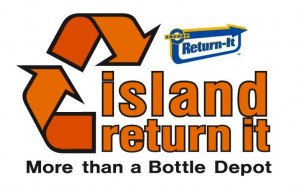Canada recycling: How to recycle batteries, paint and Tetra Paks
Huge thanks to Gill Polard  of Island Return It Recycling Centres for providing this blog post for Used.ca. Island Return It is a force on Vancouver Island, encouraging communities to recycle appliances, light bulbs and lamps, power tools, batteries, flammable liquids, and paint. They educate Islanders on what can and cannot be recycled.
of Island Return It Recycling Centres for providing this blog post for Used.ca. Island Return It is a force on Vancouver Island, encouraging communities to recycle appliances, light bulbs and lamps, power tools, batteries, flammable liquids, and paint. They educate Islanders on what can and cannot be recycled.
What can I recycle in Canada?
In Canada, we generate about 31 million tonnes of garbage each year. Sadly, only about 30 per cent of that gets recycled. With just over 10,000 current landfill sites in Canada, it’s no wonder they are all nearing capacity despite most municipalities adopting recycling programs as far back as the 1980s.
We all know that paper, cardboard, bottles and cans can be recycled through curbside pickup or recycling centres such as Vancouver Island’s Island Return it Recycling Centres but there is still some confusion around products like batteries, paint and Tetra Pak (aseptic) packaging.
How to recycle batteries: Recycle it or trash it?
Batteries should always be recycled. All batteries are recyclable, from teeny tiny hearing aid batteries to regular household batteries to large automotive and marine batteries.
When batteries first arrive at the processing plant they are sorted according to the chemical makeup of each battery. Next, they get the spa treatment – by way of a giant furnace. The valuable core is removed, if zinc is present it is extracted and used to make new things like cars, for one example. Old casings even get a new life when they go to steel plants to be reused. When batteries wind up in a landfill, the heavy metals can leach into the ground and find their way into the water system.
Early in 2014 Call2Recycle Canada, a battery stewardship program that oversees battery and cellphone collection, announced plans to go nation-wide. For nearly 20 years Call2Recycle has helped to divert more than 39 million kilograms of batteries and cellphones from Canadian landfills. Call2Recycle has collection sites at many Canadian recycling centres as well as retail outlets like Home Depot and Lowes.
How to recycle paint: Is paint recyclable?
Paint is recyclable too. Companies like Loop and Boomerang produce beautiful, quality house paints using recycled paint. The process is fascinating, watch a video about it here.
Typically when you bring a partial can of paint into a recycling centre it needs to be sealed (no drips) and have the original label intact. Collection varies from province to province but most have paint recycling programs set up with stewardships like Product Care or Stewardship Ontario.
The important thing is to not dump the paint into the sewer or outdoors. Paint contains many toxins that are harmful to the environment and should always be recycled.
How to recycle Tetra Paks: Aseptic packaging goes where?
Aseptic packaging refers to the sterile containers designed to hold food or liquids, like a juice box. Aseptic containers are made using about 80 per cent paper board to prevent light, flavours and oxygen from damaging the product within and finally a couple of layers of polyethylene to help seal out moisture.
The process used to ready Tetra Pak style containers for recycling is called hydra-pulping. Essentially the packaging is soaked in water then spun and churned in a massive blender until the aluminum and the plastic have come free. Those elements are separated out and often used to make cement or roof tiles while the leftover pulp is used to make toilet paper, tissues and notebooks.
Currently some stewardship recycling programs (like Encorp Pacific) accept aseptic containers for recycling (juice boxes have a deposit refund in certain provinces). Many other provinces already have or are planning to implement a plan similar to the new MMBC (Multi Materials British Columbia) proposal where industry takes on about 75 per cent of the costs of recycling paper and printed products. This would allow for Tetra Pak containers to be collected from more Canadian households.
If you are composting and recycling all applicable products, likelihood is your garbage output has shrunk substantially. Even more so if you shop mindfully, avoiding over-packaged products and use sites like Used.ca to find new uses and homes for consumer products that are still in good shape and don’t need to be recycled yet.